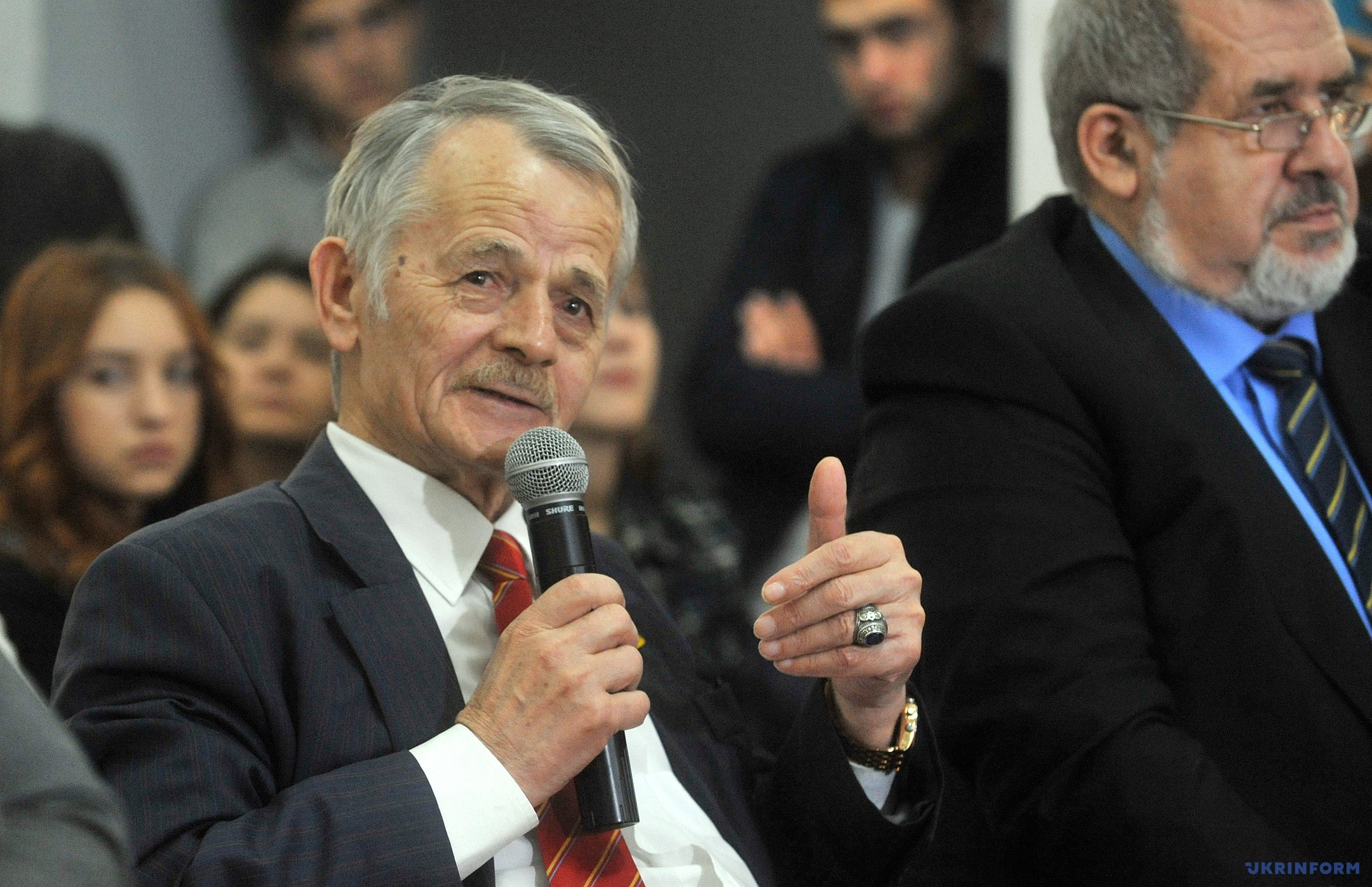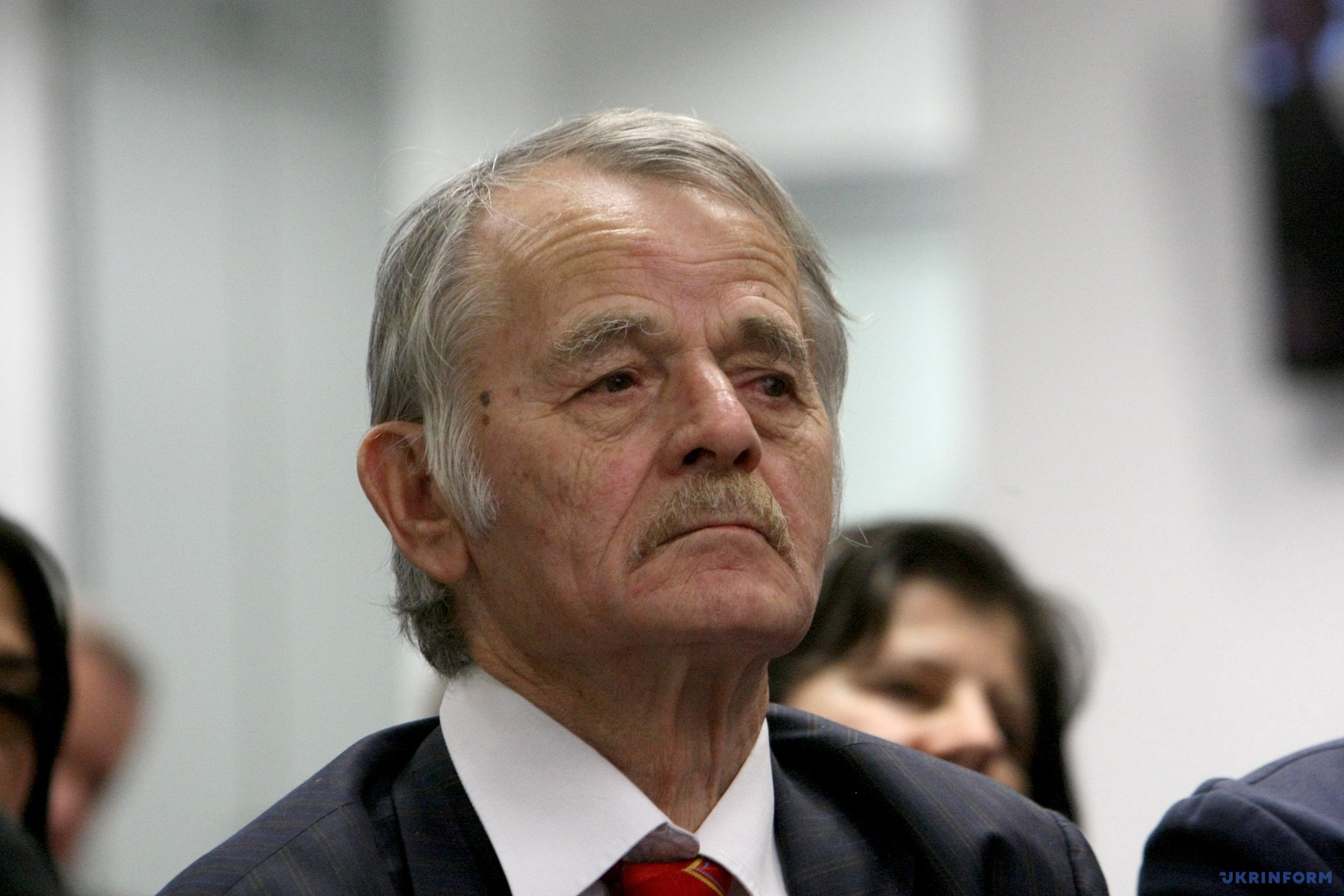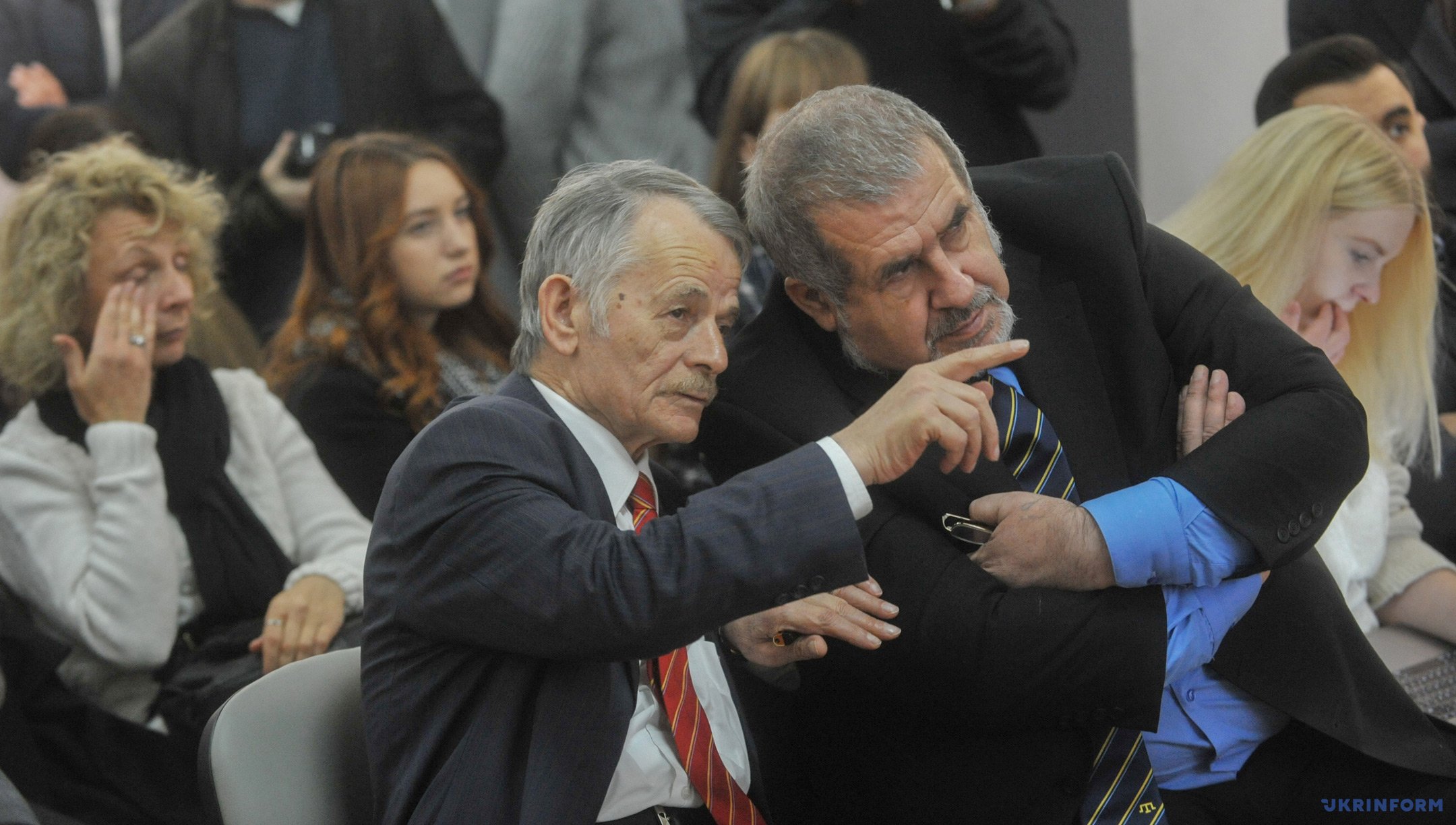In addition to an attempt to annex Crimea, the Russian authorities commit other acts of lawlessness, including by attempting to forcefully change the demography of the peninsula, which is equivalent to war crimes under the Geneva Conventions. In parallel, the Kremlin continues to intensify the militarization of the Ukrainian Crimea, turning it into a huge military base. Tougher sanctions are needed to stop Putin and bring him to negotiations. The leader of the Crimean Tatar people, Mustafa Dzhemilev, who is currently on a visit to the United States, spoke about this in an exclusive interview with Ukrinform.
Q: When we recorded a previous interview in Washington in September 2016, you said that Crimea is turning into a large military base with nuclear weapons facilities. How has the situation changed since then?
A: As for the nuclear arsenal, neither our intelligence nor NATO intelligence clearly confirms its presence in Crimea. They say that this is possible, but there is no evidence yet. However, we have information on the ground, as well as from a source in Moscow that they already have nuclear warheads there.
Judge for yourself, from the first days after occupation of Crimea, they urgently began to restore the nuclear base that was abandoned after the signing of the Budapest Memorandum. First there were truckers who carried materials, including the Crimean Tatars, who could enter there. But at some stage all these workers were taken away and replaced by people brought from Russia. Now there is a triple ring of enhanced security with video surveillance. People go there with Geiger counters and check background radiation. This, so to speak, confirms that there is a nuclear weapon.
In addition, a source from Moscow confirmed that there are already six nuclear warheads. The site is located not far from Feodosia in the Kyzyltash grove, which previously housed a nuclear storage facility.
Q: What about the militarization of Crimea in general?
A: In general, militarization has reached tremendous proportions. Children in kindergartens are dressed in military uniforms with St. George's ribbons, they play military games, looking for intelligence officers, demining something. As I was told, they even make cakes in the form of tanks - it comes to such idiocy.
In general, Russia views Crimea solely as a military base or, as they say, an "unsinkable aircraft carrier." There is practically no economy there. Russians are building strategic facilities, first of all, a huge highway "Tavrida" across the entire Crimea, destroying green plantations, cultural monuments, as well as causing damage to the environment.
In terms of the number of troops, information is different. Numbers range from 60,000 to 80,000. But even if it is about 60,000 troops, then this is a huge number for such a small peninsula with an area of 27,000 square meters.

Q: There have recently been reports that many Russian displaced persons are moved to Crimea to expel the local population, which remained on the peninsula after 2014. How critical is this situation now, and do you have any data?
A: The forced change of the demographic composition of the occupied territory, in accordance with the Geneva Conventions of 1949, refers to the category of war crimes. Therefore, the data on how many people they brought are carefully concealed. There was a media report that there are 250,000 Russian-speaking people in Crimea brought from Luhansk and Donetsk regions. In addition, in 2014, they reported about 15,000 office workers whom they brought. According to various estimates, about half a million Russians were brought into Crimean territory. At the same time, our compatriots who came from Crimea say that their number is actually bigger. It is assumed that the issue concerns about 850,000 and up to a million displaced persons.
But there are other figures here. There is a high mortality rate in Crimea due to the social and emotional state of affairs. According to official figures, the mortality rate in the occupied peninsula exceeds the birth rate by 33%. For the first time in history, the mortality rate among women exceeded this figure among men.
Russia says that the population of the occupied Crimea has increased by 10%. Taking this into account, as well as high mortality, the figures I mentioned are approximately true. They bring to Crimea a great number [of people from other regions]. But this is concealed as a military secret, because they are well aware that this is a crime.
Russia is now repeating roughly the same strategy that was used during the first occupation, under Catherine II. Then there was no opportunity to deport people, there were no railways, no railcars. They simply created unbearable conditions for people's lives, forcing them to migrate, and as a result, Crimean Tatars became a national minority in a short time. In 1944, there was total deportation and genocide.
Q: How do they create unbearable conditions now?
A: Not so long ago we intercepted one secret letter from the FSB on behalf of the so-called head of the Crimean Republic Aksionov. It concerns a three-year FSB plan for the Crimean Tatars in order to persuade them to cooperate with the occupation authorities. It says so straightforwardly: "In order to provide psycho-emotional impact on the Crimean Tatars, the Mejlis of the Crimean Tatar people who conduct Ukrainian propaganda and do not recognize the annexation it is recommended..." And it states the plans, among them massive searches under the guise of finding criminals, filtration, arrests, and the most disgusting thing is the intensified activity of patriotic Russian organizations. That, in fact, means the incitement of Russian fascists to the Crimean Tatars, incitement of interethnic hostility.
On March 13 this year, when we gathered diplomats accredited in Kyiv to inform them about the situation, and we do this each year, we acquainted them with this document. I do not know any civilized country, where, on a territory that is considered as its own, there would be the incitement of interethnic and inter-confessional hostility. In Russia this is done at the state level.

Q: Russians have recently opened the Kerch Strait Bridge with Putin's participation. What was the reaction of the Crimean Tatar community? Can this bridge stay for a long time, taking into account previously announced estimates of unfavorable conditions for such a facility?
A: The conditions are really very unfavorable, but they say that they hammered the poles of the several hundred meters deep and that they allegedly reached a hard layer of soil. However, we saw before the launch of the bridge that there were some distortions. But they, apparently, covered it cosmetically and pompously opened the bridge.
In addition, according to expert estimates, this bridge will never pay for itself. So it is unlikely that this project will ever be economically profitable.
As for the reaction of the Crimean Tatars, they basically say that it's good that they built the bridge. They brought these Russians here, so now they will have to take them back somehow. It will be difficult to do it without a bridge.
But seriously, this bridge is completely illegal. It was built without the consent of the Ukrainian state, largely on our territory. I spoke about it when they were starting construction work, that Ukraine has the full right to destroy it. Moreover, now this bridge significantly complicates the passage of vessels in the Azov Sea, causing damage to the environment.
Q: Oleh Sentsov has recently started a hunger strike to secure the release of all Ukrainian political prisoners. The same precedent occurred in 1986, when dissident Anatoly Marchenko was on a hunger strike with similar demands, but, alas, he did not survive. You were also on a hunger strike. How dangerous and difficult is it? How can such actions affect the decision of the Kremlin about the release?
A: You know, Anatoly Marchenko's hunger strike in 1986 played a role in my life. When I was in Magadan, they opened a new criminal case against me for disobedience to the laws and requirements of the camp administration. There was such a vile Andropov's article, under which people could be kept in camps forever. At that time, Anatoly Marchenko declared a hunger strike demanding the release of all political prisoners.
In my case in Magadan there was a trial behind closed doors. By all parameters, I was found guilty, but the charges were somewhat absurd. Earlier, they charged me with alleged attempts to overthrow the Soviet regime. I was found guilty on 36 counts, but the judge suddenly announced: "To sentence [Dzhemilev] to three years in prison, but taking into account the humanity of the Soviet court, given that the defendant takes care of a minor child, to give him a three-year suspended sentence with five years of probation. To release him from the courtroom."
I thought how the court could be so humane. This is my seventh conviction, and as if before I did not have minors. When my wife hugged me, she said: "Do you know at what cost you have been released? Anatoly Marchenko died three days ago. He demanded the release of all political prisoners." That is, at the cost of his life he saved other people.
But other factors also played a role in my release. I know that when Gorbachev called Andrei Sakharov and said that under the decision of the Politburo he can return to his apartment, Sakharov replied that he would not be returning and demanded that at least his closest friends be released. He handed over the list, as far as I remember, of 23 people, and I was fourth or fifth on it. Then, in Reykjavik, U.S. President Ronald Reagan passed this list to Gorbachev as a condition for the normalization of relations between the U.S. and the USSR. But, undoubtedly, Anatoly Marchenko's hunger strike played a huge role.
Now Oleh Sentsov walks almost the same way. But the difference in the current situation from the Gorbachev period is striking. Then the image was very important for Gorbachev as people were dying in terms of perestroika, democratization. World public opinion was very important for him. Putin now loses nothing.
Last October, we managed to get the release of two of our political prisoners, Ahthem Chiygoz and Ilmi Umerov. Russian media wrote that this was a "great act of humanity" of Russia, but in reality there was no humanity. Putin obtained by bargaining two professional GRU killers who practiced on the liquidation of Chechen dissidents.
As for Oleh Sentsov, Putin can resort to such an exchange. But in general, this type of exchange is somewhat immoral, because for the release of people who did not commit any crime we give them professional killers. Akhtem said to me: "If I knew that I would be exchanged for this bastard, I would have been better there." Once released, Chiygoz asked Erdogan to do everything possible to save Oleh Sentsov, because he is one of the most courageous and principled people.
Therefore, I do not even know what to say. Of course, Oleh will not end his hunger strike. But we need some effective steps that would encourage the Kremlin to resort to such a step. In this regard, I appealed to everyone to intensify the release of Oleh Sentsov.

Q: In your opinion, how can we make Russia return all Ukrainian political prisoners home?
A: There are no such ways. They have a strategy of intimidation. In general, speaking about how this is happening, it is almost impossible to protect human rights in the occupied territory in Crimea. If there were not many statements and resolutions of international organizations, the number of political prisoners would be much higher. It still serves as a deterrent factor for Russia. But there is absolutely no way to fully protect the people. De-occupation is required for this.
I met here [in the U.S.] with members of the administration and the Congress and told all of them that in order to force Putin to sit down and talk about de-occupation, we need tough sanctions, which will be like punches to his liver. That's the only way.
Q: Did you discuss sanctions against Russia? What else was discussed during meetings in Washington?
A: They were mostly interested in the human rights situation, its development, as well as the state of affairs in the occupied territory and our vision. I said that the United States has initiated some sort of platform for negotiations on de-occupation. My suggestion is to do it with the signatories of the Budapest Memorandum signatories [Ukraine, the United States, Russia and the UK] - the nuclear countries that guaranteed safety and security of the borders of Ukraine in exchange for giving up nuclear arsenal. They took it into account and said that they would discuss it.
Yaroslav Dovgopol, Washington.
